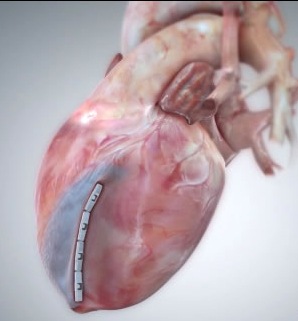
BioVentrix has announced that the first patient has been enrolled in the US arm of the ALIVE pivotal clinical trial. The trial is designed to demonstrate the safety and effectiveness of the Revivent TC TransCatheter Ventricular Enhancement System; a hybrid closed-chest procedure to treat patients suffering from heart failure symptoms related to cardiomyopathy. BioVentrix previously received investigational device exemption (IDE) approval for the study from the US FDA.
Interventional cardiologist Catalin Toma and cardiothoracic surgeon Christopher Sciortino performed the less invasive ventricular enhancement (LIVE) procedure at the UPMC Heart and Vascular Institute. The device, a press release reports, was successfully implanted with three microanchor pairs in a 42-year-old female patient with ischaemic heart failure.
The ALIVE trial plans to enrol 120 patients at up to 20 sites in the USA and U.K. with a primary endpoint analysis at one year. The trial endpoints include positive effects on volume reduction, ejection fraction, quality of life, New York Heart Association (NYHA) Class, six-minute walk test, and rehospitalisation. Readmission rates following heart failure hospitalisation remain high using standard therapies, with ≥50% of patients readmitted to the hospital within six months of discharge. Left ventricular volume reduction has been shown to significantly impact short and long-term survival rates. Annually, over one million patients are hospitalised with a primary diagnosis of heart failure, accounting for a total Medicare expenditure exceeding $17 billion.
Toma comments: “UPMC remains at the forefront of implementing promising less invasive therapies to address the need for better heart failure treatment. We are pleased to be the first US centre to implant the Revivent TC System as part of the ALIVE clinical trial. The procedure aims to reshape the left ventricle, decrease the left ventricular end systolic volume index , and increase the ejection fraction. The patient was discharged shortly after the procedure and is recovering well.”








